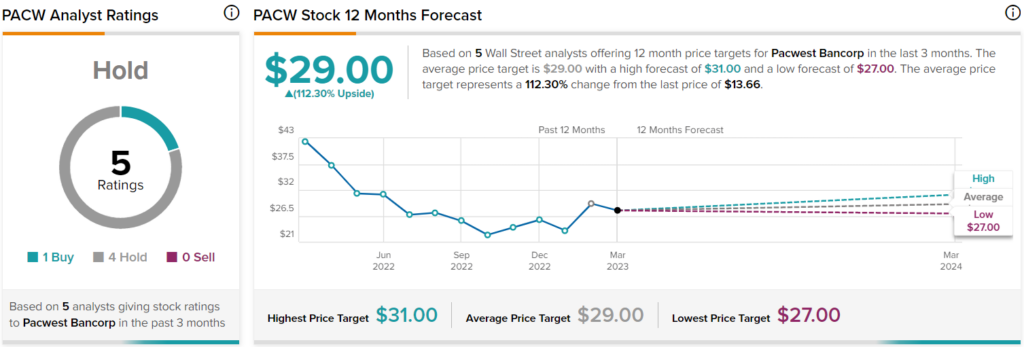In this piece, using TipRanks’ comparison tool, I evaluated two regional bank stocks, PacWest Bancorp (NASDAQ:PACW) and Western Alliance Bancorporation (NYSE:WAL), to determine if they’re worth buying on the dip. Both stocks were initially pummeled due to contagion from the collapse of Silicon Valley Bank (NASDAQ:SIVB), but they bounced back today in a massive relief rally for the financial sector.
However, they remain well below their “pre-SVB” levels, both down about 50%-60% for the last five trading days, and they look undervalued. Therefore, I am bullish on both stocks.

PacWest is a holding company for Pacific Western Bank, which describes itself as a “relationship-based community bank” that provides business banking and treasury management services to small, middle-market, and venture-backed businesses. PacWest mostly serves California, although it has one location in Denver, another in North Carolina, and loan offices in other parts of the country.
Western Alliance is another regional bank holding company, although it holds multiple subsidiaries. Most of the firm’s bank subsidiaries serve Arizona, California, and Nevada, although it also owns lender AmeriHome Mortgage.
After Silicon Valley Bank collapsed, Signature Bank (NASDAQ:SBNY) customers quickly withdrew over $10 billion in deposits, sending a ripple effect through shares of the nation’s regional banks. Investors worried that other smaller banks would see deposit flights of their own, but so far, those fears appear overblown. However, regional banks aren’t out of the woods yet, so deeper analysis is required.
PacWest Bancorp (NASDAQ:PACW)
A deeper dive into PacWest’s financials reveals a regional bank with staying power and a solid balance sheet. Perhaps the most bullish indicator is that since the plunge, insiders have been loading up on PacWest stock, a sign that the market’s fears for this bank are overblown. Thus, a bullish view appears appropriate for PacWest, at least until the shares recover to where they stood before the sell-off, at around $27.
After this week’s plunge, regional banks are trading below their three-year average price-to-earnings (P/E) ratio of 13.5 times. PacWest’s P/E is around 4.0 times, so it is significantly undervalued.
One of the most important things regional banks can do during the fallout from SVB’s collapse is to keep investors apprised of their situation, and PacWest has done that. It issued an update on Friday stating it had $33.2 billion in deposits as of March 9, compared to $33.9 billion as of December 31.
As of March 9, PacWest had about $1.9 billion in cash on its balance sheet. With $1.3 billion in revenue for 2022, compared to $1.26 billion in 2021 and $1.13 billion in 2020, Pacific Western Bank has staying power.
Lastly, as a financial firm, PacWest also offers an attractive dividend yield, which stands at 7.4% at the current stock price, albeit the yield is changing rapidly with the stock price.
What is the Price Target for PACW Stock?
PacWest Bancorp has a Hold consensus rating based on one Buy, four Holds, and zero Sell ratings assigned over the last three months. At $29, the average PacWest Bancorp stock price target implies upside potential of 112.3%.

Western Alliance Bancorporation (NYSE:WAL)
Unlike PacWest, Western Alliance insiders don’t appear to have been loading up on the firm’s shares. However, a closer look at WAL’s fundamentals and balance sheet suggests strength, making a bullish view seem appropriate at current prices.
Western Alliance has issued two updates since the turmoil in the banking sector began late last week. The most recent update was released Monday and stated that the firm had “taken additional steps to strengthen its liquidity position.”
As of Monday morning, Western Alliance had over $25 billion in cash reserves, and the firm observed only “moderate” deposit outflows, adding that insured deposits exceeded 50% of total deposits. With $2.3 billion in revenue for 2022, a significant jump from $1.84 billion in 2021, Western Alliance appears to have staying power.
WAL stock is trading at a P/E of around 2.9 times, also suggesting it may be significantly undervalued. Finally, it offers an attractive dividend yield, which stands at 5.2% at the current price.
What is the Price Target for WAL Stock?
Western Alliance has a Strong Buy consensus rating based on six Buys, one Hold, and zero Sell ratings assigned over the last three months. At $83.83, the average Western Alliance stock price target implies upside potential of 204.5%.

Conclusion: Bullish on PACW and WAL
When a major bank collapses, many investors feel tempted to head for the hills, dumping every bank stock in their portfolios due to contagion fears. However, such events just highlight the need to cut through the noise to see what’s really going on with each individual company.
Thus, a closer look suggests PacWest and Western Alliance could both be buy-the-dip opportunities.
















